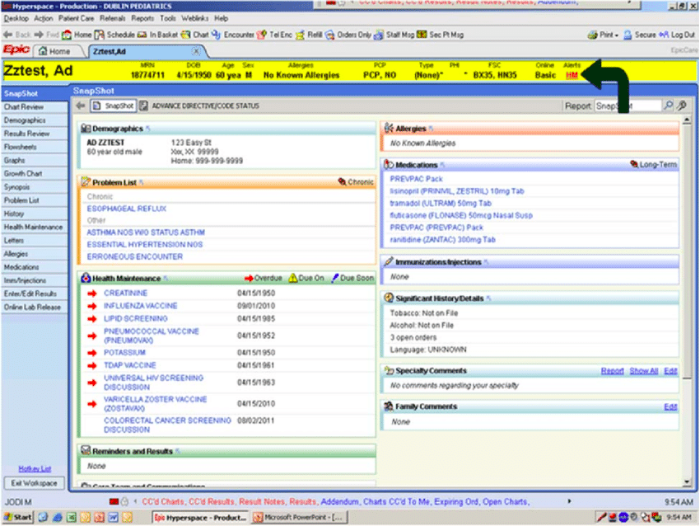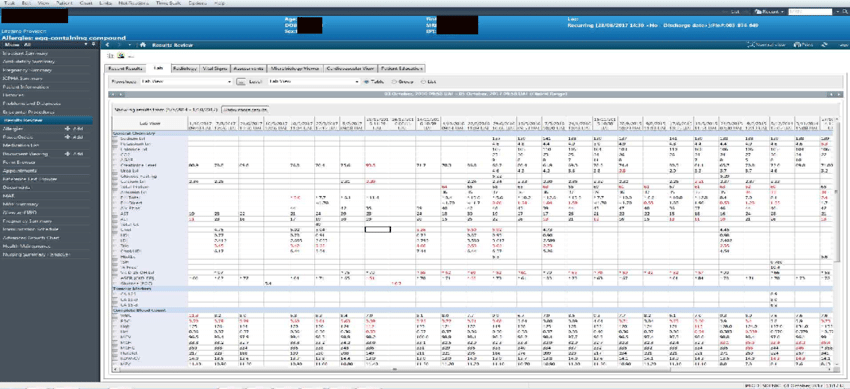Top 5 Best Hospital Information Systems
In today's rapidly evolving healthcare landscape, efficient patient care hinges on robust technology. Hospital Information Systems (HIS) are the backbone of modern hospitals, centralizing data, optimizing workflows, and ultimately, improving patient outcomes. But with a multitude of HIS vendors vying for your attention, choosing the right one can be overwhelming.
This blog cuts through the clutter, unveiling the top 5 HIS solutions that are revolutionizing healthcare delivery. Let's get started!
Components of Hospital Information System
Hospital Information system includes a variety of interconnected modules or components that automate and streamline tasks. Its components are departmental systems and systems linked to departmental systems
Departmental Systems in HIS Can Be:
- Payment: Manages financial transactions, ensuring accurate billing, processing, and recording for hospital services involving patients, insurers, and other payers.
- Pharmacy: Handles medication management, integrating prescribing, dispensing, and monitoring to promote safe and effective pharmaceutical care.
- Image Diagnosis: Supports medical imaging processes, including capturing, storing, and interpreting diagnostic images like X-rays, MRIs, and ultrasounds.
- Testing: Manages laboratory and diagnostic tests, from order to result, enabling efficient information flow within the hospital.
- Nutrition: Assists in planning and monitoring dietary services to meet patients' nutritional needs based on medical requirements and restrictions.
Other Systems in Departmental HIS: Includes pathology, cytology, surgery, functional rehabilitation, blood filtration, and blood storage systems.
Systems Linked to Departmental Systems Can Be:
- EMR System: A digital repository of patient data, consolidating medical histories, treatment plans, and lab results. It supports high-quality, coordinated care and enhances accessibility.
- Insurance: Serves as a key document for processing insurance claims.
- Medical: Facilitates record-keeping according to workflows.
- Safety: Aids in planning and implementing safety protocols for patient care.
- Order System: Allows healthcare providers to enter and manage orders for tests, treatments, and medications electronically, ensuring accurate processing and improving care efficiency.
- PACS System (Picture Archiving and Communication System): Stores and shares diagnostic images, enabling remote viewing and enhancing diagnostic efficiency across medical teams.
Read more: Basic Components of Hospital Information System
Benefits of Hospital Information System
1. Improved Patient Care and Outcomes
HIS improves patient care by providing a centralized view of medical records, enabling informed decisions, reducing errors, and fostering better communication. This leads to more effective and personalized care, improving patient health outcomes.
2. Increased Efficiency and Productivity
HIS streamlines operations by automating tasks, improving patient flow, and optimizing resource allocation. This leads to a more efficient hospital environment and allows staff to focus on patient care.
3. Enhanced Financial Performance
HIS automates administrative tasks, improves billing, and optimizes inventory management. These benefits lead to cost savings and increased revenue, enabling hospitals to reinvest in patient care, technology, and staff development.
To read more about other benefits, please visit: Discover Top 10 Benefits of Hospital Information System
Top 5 Best Hospital Information Systems
1. Epic
Epic reigns supreme in Hospital Information Systems (HIS), boasting a nearly 38% market share in the US. Renowned for its comprehensive functionality, scalability, and seamless integration, Epic has become synonymous with robust healthcare IT.
Pros
- All-Encompassing Functionality: Epic isn't merely an EHR (Electronic Health Record) system; it's a comprehensive suite encompassing patient registration, scheduling, clinical documentation, lab integration, pharmacy management, billing, and more. This one-stop shop empowers healthcare providers with a holistic view of each patient's journey.
- Scalability for All: Whether you manage a bustling academic medical center or a community clinic, Epic adapts to your needs. Its modular design allows you to implement the functionalities most relevant to your practice, with the potential to seamlessly scale up as your requirements evolve.
- The Power of Integration: Epic's strength lies in its tight integration between its various modules. Data flows effortlessly from one function to another, eliminating information silos and streamlining workflows. This translates to improved efficiency, reduced errors, and ultimately, better patient care.

Cons
- Implementation Complexity: Epic's comprehensive nature translates to a complex implementation process. Hospitals need to dedicate significant resources and time to ensure a smooth transition.
- Cost Factor: Epic is a premium solution with a higher price tag compared to some competitors. Smaller facilities might find the cost-benefit analysis less favorable.
2. Cerner (Oracle Cerner)
Cerner, now Oracle Cerner following its acquisition in 2022, is a stalwart in the Hospital Information System (HIS) landscape, holding a solid 22% market share. Renowned for its wide range of solutions and commitment to innovation, Cerner empowers hospitals and health systems to optimize care delivery.

Pros
- The breadth of Solutions: Cerner's offerings encompass EHR, revenue cycle management, population health tools, and more. This one-stop shop caters to various aspects of hospital operations, improving efficiency and financial health.
- Innovation at the Forefront: Cerner is a leader in healthcare IT innovation. They continuously invest in developing cutting-edge solutions that address evolving industry needs, such as population health management and interoperability with other healthcare systems.
- Scalability for Diverse Needs: Cerner caters to a wide range of healthcare facilities. Their modular design allows hospitals and clinics of all sizes to choose the functionalities that best suit their specific requirements.
Cons
- Implementation Complexity: Like Epic, Cerner's comprehensiveness can lead to a complex implementation process. Hospitals need to invest resources and time to ensure a smooth transition.
- Potential Integration Challenges: While Cerner offers integration capabilities, some users report challenges integrating with external systems. Careful planning and vendor communication are crucial to overcome this hurdle.
3. MMI Mediface
In the realm of Hospital Information Systems (HIS), MMI Mediface carves a distinct niche. Unlike the titans like Epic and Cerner, Miface caters specifically to smaller hospitals and clinics. This cloud-based HIS focuses on user-friendliness, ease of implementation, and affordability, making it a compelling choice for streamlining workflows and enhancing patient care in these settings.
Pros
- User-Friendly Interface: MMI Mediface prioritizes ease of use. Its intuitive interface with clear navigation and simple workflows empowers staff with minimal training, reducing adoption hurdles and maximizing efficiency.
- Cloud-Based Convenience: As a cloud-based solution, Mediface eliminates the need for expensive on-site hardware and IT infrastructure. This translates to lower upfront costs and easier maintenance, making it ideal for budget-conscious facilities.
- Focus on Core Functionalities: Mediface understands the core needs of smaller facilities. It offers a comprehensive suite of functionalities including appointment scheduling, billing, lab integration, reporting, and electronic medical records (EMR). This focus ensures you have the essential tools for streamlined operations without unnecessary complexity.
- Mobile App Advantage: Mediface goes a step further by offering a mobile app for patients. This empowers patients to access appointment details, medical history, and potentially even lab results, improving patient engagement and satisfaction.
Cons
- Limited Scalability: While offering core functionalities, Mediface might not cater to the complex needs of larger institutions requiring highly specialized features.
- Potential Feature Gaps: Compared to comprehensive HIS solutions, Mediface might have limitations in specific areas like population health management or advanced analytics.
4. McKesson Hospital Information System
McKesson is a healthcare IT giant that offers a variety of HIS solutions, including EMR, practice management, and revenue cycle management. They are known for their strong integration capabilities and focus on improving operational efficiency.
Pros
- Leveraging Supply Chain Expertise: McKesson's heritage in supply chain management translates to their HIS offerings. Their systems prioritize streamlining workflows and optimizing inventory management, potentially leading to cost savings and improved efficiency.
- Focus on Integration: McKesson understands the importance of seamless data flow across various healthcare systems. Their HIS solutions integrate well with existing McKesson products, such as pharmacy management systems, creating a unified platform for managing hospital operations.
- Scalable Solutions: McKesson caters to hospitals of varying sizes. They offer a range of HIS solutions, from basic Electronic Medical Records (EMR) to more comprehensive platforms with features like practice management and revenue cycle management.
Cons
- Limited Market Share Compared to Leaders: McKesson isn't among the top contenders in the HIS market share. This might translate to a smaller user base and potentially fewer resources available for ongoing support and development.
- Potential Feature Gaps: Compared to comprehensive HIS solutions, McKesson's offerings might have limitations in specific functionalities. Carefully assess if their features align with your specific needs.
5. Allscripts
Allscripts carves a unique niche in the Hospital Information Systems (HIS) landscape. While giants like Epic and Cerner focus on comprehensive, single-vendor solutions, Allscripts champions open architecture and patient engagement. Their flagship HIS platform, Sunrise, caters to the needs of large hospitals and health systems, fostering improved care coordination and patient empowerment.
Pros
- Open Architecture Philosophy: Allscripts embraces open architecture, allowing their HIS to integrate seamlessly with best-of-breed solutions from other vendors. This flexibility empowers hospitals to choose the tools that best suit their specific needs without being locked into a single ecosystem.
- Focus on Patient Engagement: Allscripts prioritizes patient engagement. Their solutions offer patient portals, telehealth capabilities, and mobile app integrations. This empowers patients to actively participate in their healthcare journey, improving communication and satisfaction.
- Cloud-Based Deployment Option: Allscripts offers both on-premise and cloud-based deployment options for Sunrise. This flexibility allows hospitals to choose the model that best aligns with their IT infrastructure and budget constraints.
Cons
While Allscripts offers a compelling solution, some factors require attention:
- Implementation Complexity: Sunrise, like other comprehensive HIS solutions, can involve a complex implementation process. Hospitals need to dedicate resources and time to ensure a smooth transition.
- Potential Integration Challenges: Managing integrations with various best-of-breed solutions requires ongoing effort and technical expertise. Hospitals need to have a robust IT team to ensure seamless data flow across the entire system.
Conclusion
In conclusion, navigating the HIS landscape requires a keen understanding of your hospital's unique needs. From comprehensive powerhouses like Epic and Cerner to user-friendly solutions like MMI Mediface, each HIS vendor offers distinct strengths. Consider your budget, facility size, and desired functionalities to make an informed decision. It's important to note that this blog serves as a foundational guide – explore all options and conduct thorough research to find the perfect HIS that propels your hospital toward the future of exceptional patient care.
See also: What Do You Need for Successful HIS Implementation





